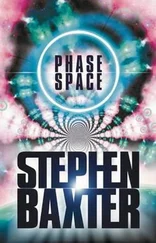Philmus glanced at Boyle, but his face was impassive.
Himmelfarb went on, ‘This is also the heart of the Vatican’s science effort. It may seem paradoxical to you that there is not necessarily a conflict between the scientific world-view and the Christian. In Dante’s Aristotelian universe, the Earth is the physical centre of all things, but God is the spiritual centre. Just as human nature has twin poles, of rationality and dreams. Dante’s universe, the product of a thousand years of contemplation, was a model of how these poles could be united; in our time this seems impossible, but perhaps after another millennium of meditation on the meaning of our own new physics, we might come a little closer. What do you think?’
Philmus shrugged. ‘I’m no Catholic.’
‘But,’ said Himmelfarb, ‘you are troubled by metaphysics. The state of my electronic soul, for instance. You have more in common with me than you imagine, officer.’
They reached a heavy steel door. Beyond it was a small, glass-walled vestibule; there were sinks, pegs and lockers. And beyond that lay a laboratory, stainless steel benches under the grey glow of fluorescent lights. The lab looked uncomfortably sharp-edged by contrast with the building which contained it.
With confidence, Himmelfarb turned and walked through the glass wall into the lab. Philmus followed. The wall was a soap-bubble membrane that stretched over her face, then parted softly, its edge stroking her skin.
Much of the equipment was anonymous lab stuff – rows of grey boxes – incomprehensible to Philmus. The air was warm, the only smell an antiseptic subtext.
They reached a glass wall that reached to the ceiling. Black glove sleeves, empty, protruded from the wall like questing fingers. Beyond the wall was an array of tiny vials, with little robotic manipulators wielding pipettes, heaters and stirrers running on tracks around them. If the array was as deep as it was broad, Philmus thought, there must be millions of the little tubes in there.
Himmelfarb stood before the wall. ‘My pride and joy,’ she said dryly. ‘Or it would be if pride wasn’t a sin. The future of information processing, officer, perhaps of consciousness itself …’
‘And all of it,’ said the Monsignor, ‘inordinately expensive. All those enzymes, you know.’
‘It looks like a DNA computer,’ Philmus said.
‘Exactly right,’ Himmelfarb said. ‘The first experiments date back to the last century. Did you know that? The principle is simple. DNA strands, or fragments of strands, will spontaneously link in ways that can be used to model real-world problems. We might model your journey to Rome, officer, from –’
‘San Francisco.’
The air filled with cartoons, twisting molecular spirals.
‘I would prepare strands of DNA, twenty or more nucleotide bases long, each of which would represent a possible transit point on your journey – Los Angeles, New York, London, Paris – or one of the possible paths between them.’
The strands mingled, and linked into larger molecules, evidently modelling the routes Philmus could follow.
‘The processing and storage capacity of such machines is huge. In a few grams of DNA I would have quadrillions of solution molecules –’
‘And somewhere in there you’d find a molecule representing my best journey.’
‘And there’s the rub. I have to find the single molecule which contains the answer I seek. And that can take seconds, an eternity compared to the fastest silicon-based machines.’ The cartoons evaporated. Himmelfarb pushed her Virtual hand through the wall and ran her fingers through the arrays of tubes, lovingly. ‘At any rate, that is the challenge.’
Monsignor Boyle said, ‘We – that is, the Pontifical Academy – funded Eva’s research into the native information processing potential of human DNA.’
‘Native?’
Abruptly the lab, the wall of vials, crumbled and disappeared; a hail of pixels evaporated, exposing the Edenic forest once more.
Philmus winced in the sunlight. What now ? She felt disoriented, weary from the effort of trying to track Himmelfarb’s grasshopper mind.
Himmelfarb smiled and held out her hand to Philmus. ‘Let me show you what I learned from my study of Dante.’ The young priest’s Virtual touch was too smooth, too cool, like plastic.
The Monsignor seemed to be moaning again. Or perhaps he was praying.
‘ Look at the sun, ’ said Himmelfarb.
Philmus lifted her face, and stared into the sun, which was suspended high above Eden’s trees. She forced her eyes open.
It wasn’t real light. It carried none of the heat and subtle weight of sunlight. But the glare filled her head.
She saw Himmelfarb; she looked as if she was haloed.
Then she looked down.
They were rising, as if in some glass-walled elevator.
They were already above the treetops. She felt no breeze; it was as if a cocoon of air moved with them. She felt light, insubstantial, like a child in the arms of her father. She felt oddly safe; she would come to no harm here.
‘We’re accelerating,’ Himmelfarb said. ‘If you want the Aristotelian physics of it, we’re being attracted to the second pole of the universe.’
‘The second pole?’
‘God.’
Looking back Philmus could see the Earth, heavy and massive and unmoving, at the centre of everything, a ball of water folded over on itself. They were already so high she couldn’t make out Purgatory.
Rising ever faster, they passed through a layer of glassy light, like an airliner climbing through cloud. As they climbed higher she saw how the layer of light folded over the planet, shimmering like an immense soap bubble. Embedded in the membrane she could see a rocky ball, like a lumpy cloud, below them and receding.
It was the Moon.
She said, ‘If I remember my Ptolemy –’
‘The Earth is surrounded by spheres. Nine of them, nine heavens. They are transparent, and they carry the sun, Moon, and planets, beneath the fixed stars.’
The Monsignor murmured, ‘We are already beyond the sphere of decay and death.’
Himmelfarb laughed. ‘And you ain’t seen nothing yet.’
Still they accelerated.
Himmelfarb’s eyes were glowing brilliantly bright. She said, ‘You must understand Dante’s geometrical vision. Think of a globe of Earth, Satan at the south pole, God at the north. Imagine moving north, away from Satan. The circles of Hell, and now the spheres of Heaven, are like the lines of latitude you cross as you head to the equator …’
Philmus, breathless, tried not to close her eyes. ‘You were telling me about your research.’
‘ … All right. DNA is a powerful information store. A picogram of your own DNA, officer, is sufficient to specify how to manufacture you – and everything you’ve inherited from all your ancestors, right back to the primordial sea. But there is still much about our DNA – whole stretches of its structure – whose purpose we can only guess. I wondered if –’
The Monsignor blew out his cheeks. ‘All this is unverified.’
Himmelfarb said, ‘I wondered if human DNA itself might contain information processing mechanisms – which we might learn from or even exploit, to replace our clumsy pseudo-mechanical methods …’
Still they rose, through another soap-bubble celestial sphere, then another. All the planets, Mercury through Saturn, were below them now. The Earth, at the centre of translucent, deep blue clockwork, was far below.
They reached the sphere of the fixed stars. Philmus swept up through a curtain of light points, which then spangled over the diminishing Earth beneath her.
‘One hell of a sight,’ Philmus said.
‘Literally,’ said the Monsignor, gasping.
Читать дальше












